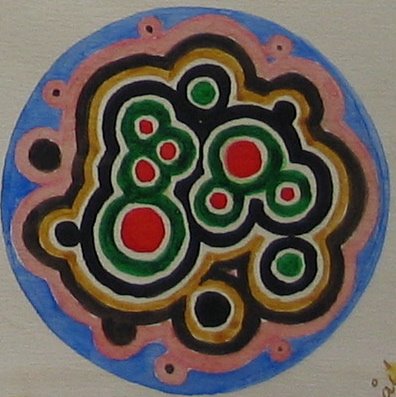My aunt Inger was the oldest and not as bright as the rest of the siblings. The story went that she had fallen off a swing and hurt her head when she was little. There was a degree of snobbery in the family; lack of intelligence, or just lack of higher education, was looked down upon, and there had to be an explanation for her not being up to the family standard.
 The five oldest girls with Inger at the right, my mother at the left
The five oldest girls with Inger at the right, my mother at the leftIn my home a lot of the social life was centered on Contract Bridge, the cardgame that rivals chess in complexity, and which was played with gusto. Inger liked very much to play, but it was annoying for the others when she stumbled through the game and brought her team down, so it was always a sacrifice to include her. My cousins and I didn’t much like her; maybe we were cruel in our self-centeredness, but we picked up on the grown-up’s attitude.
Inger also had a particular little cover-up laugh she laughed when everybody else was laughing and she had not understood. She was thrifty, not to say stingy, with small amounts. I remember her coming into the dining room with a plate in her hand, saying: “The liverpaste is still good, I have scraped the mold off.” That, of course, became part of the family lore. It happened in a summer cottage she had built in Arild, our favorite summer spot at Kullen in Sweden. Now we stayed with her instead of renting, for the family feeling was a strong undercurrent beneath the sometimes-choppy waves.
When I came out, I didn’t come out to Inger, but told her only about giving up my job as engineer and wanting to study with an art teacher and paint. She asked to have a talk with me and begged me to promise that if I hadn’t “succeeded” in a year’s time I would return to engineering. I was very insecure, but, without trying to hide my uncertainties, I made her see that such a promise was impossible and absurd.
For many years I didn’t see aunt Inger that often, for I lived far from her and traveled a lot. Several times she helped me out and she never withdrew her love or judged my life. When it came to true generosity, she had a big heart. As I was the only one in the family who didn’t have a secure and well-paid job, she wanted to let me inherit her whole estate, but my uncle, who invested her capital for her, talked her into establishing instead a trust fund, the interest of which I could receive as long as I lived. The others agreed to wait with their inheritance until my death. That was a good solution for me; I still have this welcome addition to my income. If I had inherited the capital it would have evaporated long ago.She was the only one of the six sisters who didn’t suffer from depressions or other mental illness, until, in her last years, before she died at the age of 92, senility clouded her mind. When I came back from two years in France and said I would go and see her, I was told: “It isn’t worthwhile, she will not recognize you”.
“Well I’ll go and see her anyway,” I said.
She was in bed and I could see that she was close to death.
I took her hand and she asked: “Who is it?”
“Åge,” I said.
“A nephew of mine?” she said, and I kept her hand in mine and sat with her for a while. I allerted the family and she died two days later.
Funny, I shaved once in my sixties after having had a beard for many years. Whose face should look out at me from the mirror but my aunt Inger’s! It was disconcerting - though I had come to appreciate her after I grew up and when her age fused her shortcomings with the natural frailties of old age. How many hours of Scrabble have I passed with her, leading to uncountable victories for me!


No comments:
Post a Comment